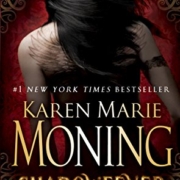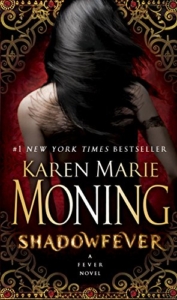I wrote this review of Karen Marie Moning’s Shadowfever a few years back and rediscovered it a couple of months ago when I downloaded material from an inactive blog of mine before it went offline. The Shadow series holds a special significance to me. While reading the books I fell in love with urban fantasy. And the series influenced me when I set out to write Daemon Seer.
I spent all day reading an urban fantasy called Shadowfever, the fifth in a series of novels by Karen Marie Moning. The book is over 600 pages long. I’m starting to think readers perceive length differently with an ebook. They don’t feel the volume weighting their hands or the thickness of the pages yet to be turned. They see a number giving the percentage of the book they’ve read so far, but it lacks physical reality. Easy to glide through a novel as though sailing over a vast lake, glimpsing land on the horizon without a sense of its distance. I read and read for hours and hours and awoke the next morning with a migraine. Now that I’ve finished the story and know the outcome, now that the headache is fading, I can’t help reflecting on why I subjected myself to such a grueling read-a-thon.
The Shadow series tells the story of MacKayla Lane, a girl from a small town in Georgia whose sister is brutally murdered while studying in Ireland. Mac spends her time painting her nails, hanging out by the pool, and listening to tunes on her iPod. Then the death of her sister spurs her to travel to Dublin and ensure the killer is caught and brought to justice. There she discovers she’s a sidhe-seer, one of an ancient order of women who can see the Fae. To ordinary people the Fae appear human, but Mac sees the monsters hidden beneath their glamour. She becomes involved with a sinister and sexually magnetic man who—it becomes increasingly clear—isn’t human either and is searching for a mystical book that will prevent the Fae from destroying the world.
Mac makes one unsettling discovery after another about her sister and herself. Illusion, misdirection, and deception pervade the five novels. Repeatedly, she believes she understands what’s going on, only to have her reality shattered by some new revelation. What begins as a search for her sister’s murderer grows into a struggle to save the world and a quest to discover the truth about her origins.
Moning is skilled at springing surprises and ratcheting up suspense. The first four novels end in cliffhangers that compel the reader to reach for the next in the series. Here I should mention that the first one was a free Kindle download. Publishers occasionally bait the hook with a freebie. It sure worked with me. Though Mac is occasionally annoying, her character grows more complex and interesting from one book to the next. The fantastic worlds she explores are richly imagined.
The books have some great sex scenes—passionate and occasionally funny, and on one occasion harrowing as Mac is gang raped by Fae princes and left in a state of mindless, constant, sexual hunger. And, of course, there’s plenty of violence.
These attractions are counter balanced by writing that occasionally makes me wince. Grating, clichéd phrases (“to die for,” “getting on my last nerve”). Commentary or exposition that repeats almost word-for-word passages from earlier in the story, as if the writer had copied and pasted material. Some of this fits the first-person narration; people do use clichés and repeat themselves. Still, I’ve seen more artful techniques for creating a convincing narrative voice. And there are the overused dialogue tags. Even the inhuman characters do a whole lot of sighing and shrugging.
I finished Shadowfever feeling sated, as though I’d snarfed a whole box of delicious chocolates. (Hey, chocolates are rich in antioxidants!) Instead of a bellyache I had a headache from those frozen hours staring at the Kindle screen. Yet I’m not sorry. I’ve been gorging on novels since childhood, and without that pleasure I would never have come to love reading fiction. No way am I going on a diet now.







